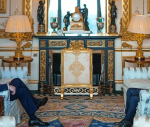You are here
Facing latent radical elements
Jul 26,2015 - Last updated at Jul 26,2015
To face the current waves of radicalism, many believe that Jordan should adopt a deradicalisation strategy. It is not just Jordan, as recent events prove that extremism seems to be a disease many countries are suffering from, yet strategy makers should answer some serious questions before drawing up their plan.
In the Arab world, when it comes to religious theology, I have always wondered about the real meaning of two words: “conservative” and “moderate”. Thus, trying to define the two words would possibly lead us to some serious issues regarding the entire concept of radicalism. Any society has social, cultural, economic and ideological differences. Accordingly, many political tendencies appear, and at the same time people can be divided into moderate and extremist, liberal and conservative. However, those differences are being run by the sense of equality, respect and pluralism, and respectively, when these elements are missing and one doctrine declares its superiority over others, it will be impossible to apply the above mentioned political categories.
What does the word “moderate” mean? From my point of view, “moderate” is a word used to describe those who accept the other, believing in their right to practise their faith, beliefs and convictions, those who believe in pluralism. So I wonder how some political doctrines are described as moderate powers! And they are “moderate” for being what? Not having weapons in hand so far! The Islamists who have raised their children by telling them that they are superior to others, they will go to heaven and the rest will go to hell — are they considered moderate? This will lead us to believe that we need to revise the whole doctrine that considers its followers superior to others, and give them the right to ask people to change just to be similar to them as they have the right path.
The other issue is the concept of conservatism. Many defend their closed minds and radical attitudes under the right of being conservative. Actually, the risk behind such a phenomenon is that conservatism is being used as a mask to root radicalism. Therefore, it is normal to be conservative, but what is not normal, is when being conservative means refusing the rights of other to live according to their beliefs and wishes, preventing people from having their own lifestyle and ideology, or even trying to impose certain beliefs, convictions, lifestyles and visions on them. Mosque preachers who call for supporting mujahedeen on microphones, or speak against Christians and the West etc. can never be described as moderate or conservative. Essentially, they confirm the incompatibility between moderate and such ideology. Moreover, it is quite significant then to highlight these crucial differences between reality and the definition used to understand the kind of diagnosis we really need today.
It is important to understand that the deradicalisation battle is a very long and complicated one; it will be full of ups and downs, but it is impossible to win without having a clear diagnosis of the problem and establishing genuine ideas for the remedy. Any deradicalisation strategy should enhance the human perspective, equality, respect and pluralism, where people get rid of the idea of imposing their beliefs on others and respect people regardless of their religious or ethnic origins.
In this context, NGOs involved in the reform and development of schools, should take this into consideration, as deradicalisation calls for cultural and mentality changes, and this starts from the school itself.













